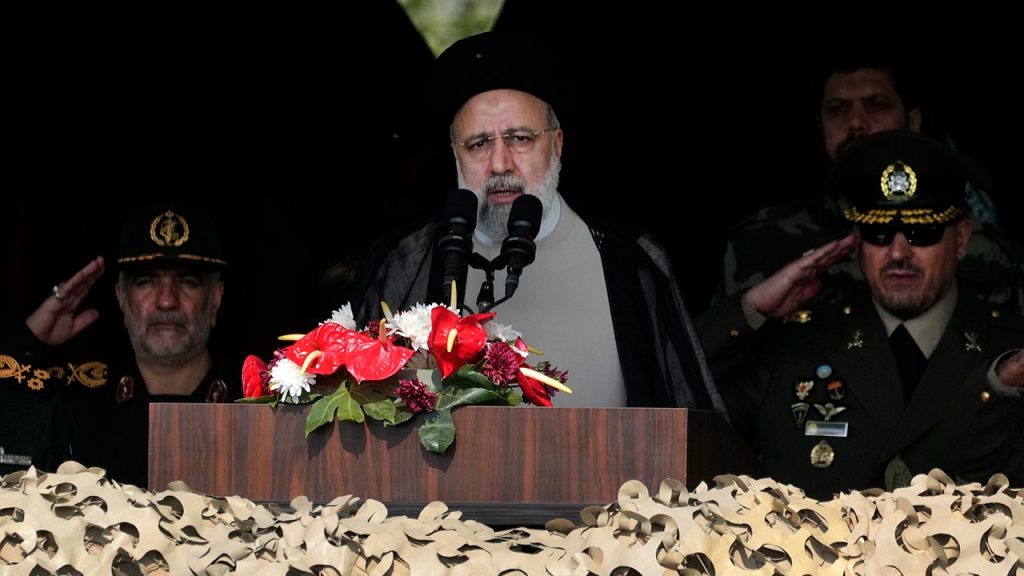Iranian President Ebrahim Raisi chose to downplay Israeli strikes against Iran during a Friday speech, rather than mention the missile strike launched against the Isfahan region of Iran earlier the same day. Instead, Raisi focused on justifying Iran’s own offensive attacks, including Operation True Promise, which involved drone missile and drone launches against Israel. This operation was in response to an apparent strike on Iran’s embassy compound in Syria that killed 12 people, including two Iranian generals. Despite threats of total war in the event of the “tiniest invasion,” Raisi described the attack on Israel as a limited one and warned that if provoked, Iran could carry out a larger attack that would leave nothing remaining from the Zionist regime.
Israel, with support from the U.S., the United Kingdom, neighboring Jordan, and other nations, successfully intercepted nearly every missile and drone that Iran launched during Operation True Promise. Through the use of its Iron Dome and David’s Sling systems, Israel boasted of a 99% success rate in preventing these attacks. The fact that Iran’s president downplayed the Israeli retaliatory strike indicates a significant gap between earlier rhetoric threatening total war and the country’s current disposition moving forward. This ongoing conflict between Israel and Iran, known as a shadow war, has escalated in recent months as Iran has supported Hamas, which carried out a deadly terror attack in Israel on Oct. 7.
The Iranian leadership’s response to Israeli strikes and their ongoing conflict with Israel has led to further tensions between the two countries. The White House has announced new sanctions on Iran following the latest attack against Israel, with a promise that the pressure will continue. Despite Iran’s threats and military actions against Israel, Israel remains vigilant in defending itself with the help of allies and advanced defense systems. The lack of acknowledgment of Israel’s retaliatory strike by Iranian leadership and the downplaying of the attack as limited indicate a shift in their previous stance of vow to total war in case of invasion.
The direct military attack by Iran on Israel marks a significant escalation in tensions between the two countries, leading to an increased risk of further conflict. Iran’s use of drones and missiles in the attack signals their willingness to engage in direct military actions against Israel, despite the risks involved. The success rate of interception by Israel’s defense systems demonstrates their capability to defend against such attacks and mitigate the threat posed by Iran’s offensive actions. The ongoing shadow war between Israel and Iran continues to simmer, with the potential for further escalation and conflict in the future.
While the recent attacks between Israel and Iran have not resulted in widespread destruction or casualties, the threat of a larger conflict looms over the region. Both countries are heavily invested in defending their interests and maintaining their respective positions in the Middle East, leading to a cycle of retaliation and escalation. The lack of direct communication and de-escalation efforts between the two sides increases the likelihood of further military actions in the future. The international community, including the United States and other allies, plays a crucial role in preventing further escalation and promoting peaceful resolution of conflicts between Israel and Iran.
In conclusion, the recent Israeli strikes against Iran and Iran’s retaliatory actions highlight the ongoing conflict between the two countries and the potential for further hostilities. The downplaying of the attacks by Iranian leadership and the threat of larger-scale attacks indicate a volatile situation that could lead to a full-scale war. The involvement of other nations and international sanctions further complicates the situation, adding pressure on both sides to seek a peaceful resolution. The shadow war between Israel and Iran continues to pose a threat to regional stability, underscoring the need for diplomatic efforts to ease tensions and prevent further escalation of conflict.


